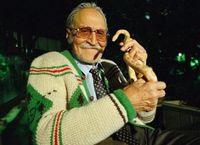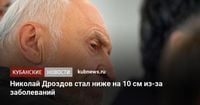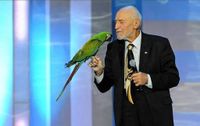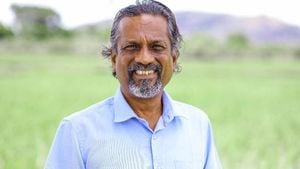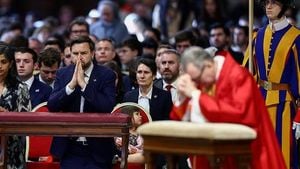Television presenter Nikolai Drozdov has faced significant health challenges, resulting in a dramatic loss of height due to osteoporosis, a chronic skeletal disease that he was diagnosed with five years ago. Previously standing at approximately 180 centimeters, Drozdov's height has now decreased to 170 centimeters, as reported by the Telegram channel Mash.
Osteoporosis, a condition characterized by weakened bones due to a lack of calcium, has led to various health complications for the 80-year-old zoologist. The disease not only causes significant pain in the joints but also results in muscle cramps, curvature of the spine, and rapid weight loss, which are all contributing factors to his reduced stature.
Drozdov's health issues have been compounded by a series of accidents. Two years ago, he fell near Moscow State University and broke seven ribs, adding to a history of injuries that includes fractures of his wrists, hips, and collarbone. Following these incidents, doctors recommended that he engage in controlled physical activity, maintain a balanced diet, and adhere to a specific therapeutic regimen to manage his condition.
In addition to Drozdov's health concerns, the world of Russian celebrity has seen its share of financial troubles. Renowned ballerina Anastasia Volochkova has decided to sell her luxurious six-room apartment in St. Petersburg, a move prompted by a significant debt of 127,000 rubles for utility services that has accumulated over several years. The apartment, which spans 196 square meters and is located in the historic center of the city on Italian Street, is valued at 165 million rubles.
Volochkova's financial struggles extend beyond St. Petersburg; she also faces a debt of nearly 67,000 rubles for her apartment in Moscow's Petrovsky Lane. This financial burden has led her to take drastic measures, including the sale of her property. Interestingly, the ballerina previously managed to recover 2 million rubles from brokers after she brought her financial issues to public attention.
In a different vein, the Russian Orthodox Church has recently addressed a question regarding dietary practices during the Easter season. Protopresbyter Mikhail Potokin, acting head of the Synodal Department for Charity of the Russian Orthodox Church, discussed whether followers of Islam and Judaism could partake in Easter cakes. He suggested that while it is unlikely that individuals of different faiths would consume blessed Easter cakes, there is no harm in doing so if they choose. "If someone wants to eat the cake, why not? If a person wishes to partake, it is unlikely to cause harm," he stated.
The topic of dietary choices has sparked interest, particularly in light of the upcoming Easter celebrations. Potokin's remarks highlight the importance of interfaith dialogue and the sharing of cultural practices, which can foster understanding and goodwill among different communities.
Meanwhile, the political landscape has also been stirring. American President Donald Trump has extended sanctions against Russia for another year, despite his apparent attempts to foster a closer relationship with Russian leader Vladimir Putin. This decision has surprised many observers and has led to speculation about the underlying reasons for the continued sanctions.
Analysts suggest that Trump may have succumbed to pressure from allies who criticized his perceived leniency towards Russia. The extension of these sanctions has dashed hopes for improved diplomatic relations and has further complicated the already tense dynamics between Washington and Moscow. As reported by the Chinese publication ABN24, this development indicates that the ice between the two nations has not thawed.
In Germany, tensions are rising as well, particularly in the lead-up to the election of a new federal chancellor. Former Russian president Dmitry Medvedev has publicly criticized Friedrich Merz, a candidate who has called for Ukraine to take more aggressive action against Russia. Medvedev labeled Merz a "Nazi" and cautioned him to think carefully before making statements about attacking Russia.
This rhetoric has drawn ire from German commentators, who find it particularly striking given that Merz has yet to assume office. The situation underscores the fraught relationship between Germany and Russia, especially as Merz has advocated for the supply of Taurus missiles to Ukraine, a move that current Chancellor Olaf Scholz opposes due to concerns about escalating conflict.
Amidst these political tensions, Dr. Alexander Myasnikov, a well-known physician, has weighed in on health matters, specifically regarding the efficacy of multivitamins. In a recent program, he debunked common myths surrounding dietary supplements, asserting that most vitamins on the market are unnecessary.
Myasnikov emphasized that the only vitamin worth taking as a supplement is vitamin D, particularly for vulnerable populations such as pregnant women, children, the elderly, and vegetarians. He noted that vitamin D is primarily obtained from sunlight and certain foods, such as fish and milk. However, he advised individuals to consult with a physician and undergo testing to determine their vitamin D levels before beginning any supplementation, to avoid potential overdoses and adverse health effects.
In the world of entertainment, legendary singer Alla Pugacheva stirred curiosity with a mysterious video posted on social media, thanking both her fans and detractors. The video, which features her face in a circle and lacks a clear message, has left viewers speculating about its meaning. Pugacheva recently celebrated her 76th birthday, and she expressed gratitude for the increasing number of well-wishers each year.
As the stories of health, finance, politics, and culture intertwine in this vibrant tapestry of Russian life, they reflect the complexities and challenges faced by individuals and society alike. From Drozdov's health struggles to Volochkova's financial decisions, and from interfaith discussions to political maneuvers, these narratives offer a glimpse into the multifaceted experiences that define contemporary Russia.
